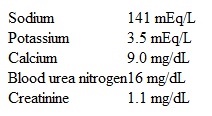A 53-year-old Caucasian man comes to the office for intermittent generalized headaches 8 months after deceased donor kidney transplantation. The patient's post-transplantation course was complicated by an episode of acute rejection at 2 months that was treated effectively with high-dose corticosteroids. He has diabetes mellitus and hypertension. His medications include insulin, atenolol, cyclosporine, mycophenolate mofetil, and vitamin D. No changes were made to his medications recently and his immunosuppressants are at therapeutic levels. The kidney donor had no personal or family history of hypertension. The patient's temperature is 36.1 C (97 F) , blood pressure is 180/110 mm Hg, and heart rate is 90/min. Examination shows no abnormalities. His serum laboratory values are:  The patient is started on sodium restriction, amlodipine, and enalapril to control the hypertension. One week later, he returns with a blood pressure of 138/86 mm Hg. His serum creatinine level is 2.4 mg/dL. Which of the following is the most likely underlying cause of this patient's hypertension?
The patient is started on sodium restriction, amlodipine, and enalapril to control the hypertension. One week later, he returns with a blood pressure of 138/86 mm Hg. His serum creatinine level is 2.4 mg/dL. Which of the following is the most likely underlying cause of this patient's hypertension?
A) Increased cardiac output
B) Increased sympathetic output
C) Overproduction of endothelin
D) Renin-angiotensin system activation
E) Sodium and fluid retention
Correct Answer:
Verified
Q458: A 21-year-old college student is brought to
Q459: A 52-year-old man is brought to the
Q460: A 52-year-old man is brought to the
Q461: A 5-week-old full-term boy is brought to
Q462: A 28-year-old man comes to the clinic
Q464: A 60-year-old Caucasian man is admitted to
Q465: A 22-year-old man comes to the office
Q466: A 60-year-old Caucasian man is admitted to
Q467: A 26-year-old man with a 5-year history
Q468: A 60-year-old man is taken to the
Unlock this Answer For Free Now!
View this answer and more for free by performing one of the following actions

Scan the QR code to install the App and get 2 free unlocks

Unlock quizzes for free by uploading documents